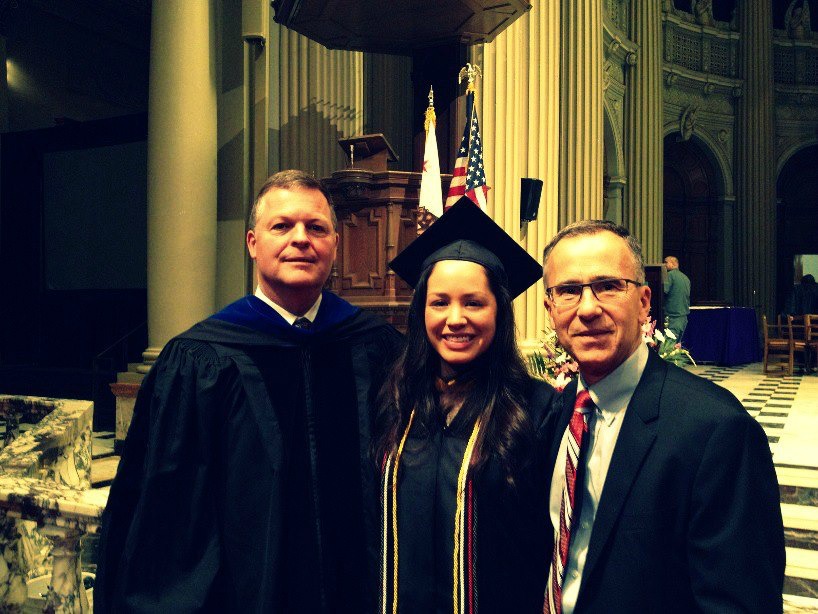
On March 26 and 27 the Supreme Court will hear arguments in the DOMA and Proposition 8 cases. The decisions in both cases will address a common question: Should all Americans have the freedom to marry the person they love?
The children being raised by LGBT parents are in an excellent position to answer that question -- and across the United States they are speaking out. The Family Equality Council and our coalition partners have filed a "Children's Voices" amicus curiae brief asking the Supreme Court to consider what these young people have to say about their families.
Sarah Gogin lives in California and is one of the amici in the "Children's Voices" brief.

Photo courtesy of Sarah Gogin
"We're a pretty traditional 'untraditional' family," she muses. The traditions that mean the most to her family? Beginning when she was young, Sarah and her parents had "Friday Night at the Movies," ordering pizza and watching a classic film together every week. Sarah credits this time with her fathers with endowing her with a lifelong appreciation of black-and-white films and, she jokes, "a great sense of fashion!"
The McPherson-Gogin family is Irish, Italian and Catholic, which means "big celebrations at Christmas and Easter," and "of course, a lot of food." Religion, she adds, "is a very important part of my family's life." So is their connection to their community. They have "a lot of San Francisco pride," and, Sarah adds, her Pop has become a mentor for many of her friends and classmates over the years. In the "Children's Voices" Supreme Court brief, Sarah describes how her Dad "became assistant soccer coach and one of the key members of the [high school] Athletic Board," while her Pop "became the first male president of the Mother's Board."
To get there, though, Sarah's dads had to put a great deal of time and thought into finding an open, supportive school environment. In order to educate their daugher at a Catholic school, they had to go outside their local parish because of what Sarah calls "this tension ... sort of beating around the bush because of my family background, but not always saying outright, 'We won't accept Sarah.'" The end result, she says, was absolutely worth it: "tons of faculty and family support across the board." Her friends and their parents felt comfortable asking questions about Sarah's family, even challenging ones like, "How are you going to teach her to be a woman?" Her dads' response, Sarah says, was always, "Just like any other parent." "They raised me to be a contributor to society," she explains. "They would tell people, 'We're teaching our daughter to be a responsible, loving, successful adult.'"
As a teen, Sarah says, "I became the fourth-generation McPherson-Gogin to attend St. Ignatius College Preparatory." While she had the typical ups and downs of adolescence, Sarah also confronted homophobia. "Going down the hall," she remembers, "you could hear people saying 'fag,' 'queer,' and even if it wasn't directed at me, it still affected me." The lessons Sarah learned at home helped her confront prejudice and negativity with action and compassion. As she describes it, "My parents have taught me you can either learn from a bad situation or you can run from it. They've taught me to keep moving; remember the past but keep going forward."
So Sarah did. She started reaching out, teaching people about her family, and at age 16 she was featured in the COLAGE documentary In My Shoes: Stories of Youth With LGBT Parents. Although Sarah's high school would not allow a gay-straight alliance (GSA), she helped create a Safe Spaces Club that hosted an annual Day of Silence, along with a number of speakers and other programs.
If Sarah had to give some advice to young people with LGBT parents, she would say, "Don't give up. Don't be afraid. I think a lot of times kids get scared of what other kids might do if they say their parents are gay. And, yeah, times are gonna get rough, but you have to be strong about who you are and who your family is."
Sarah attributes a lot of her personal strength and conviction to her upbringing. Her parents taught her "some great lessons about building relationships" and "to stand up for myself and not change just because someone else wants you to." As she describes the challenges her fathers have faced and overcome through the decades, it's clear that Sarah's heritage has inspired her to live her own life with determination and authenticity.
And now Sarah has sent a message to the Supreme Court, telling her family's story alongside other outspoken youth. She sums it up: "My parents must have done something right to get to this point. They have worked so hard, through so much adversity, to reach this point where they are successful and happy. Why would you have anything against them being married in the eyes of law?"
If the court agrees with her, Sarah says, it will be "a time to celebrate everything we've been through to reach this point, and the good to come." But regardless, in Sarah's own words, "my family is the same as yours.
"We love the same, hurt the same. We are the same as you."